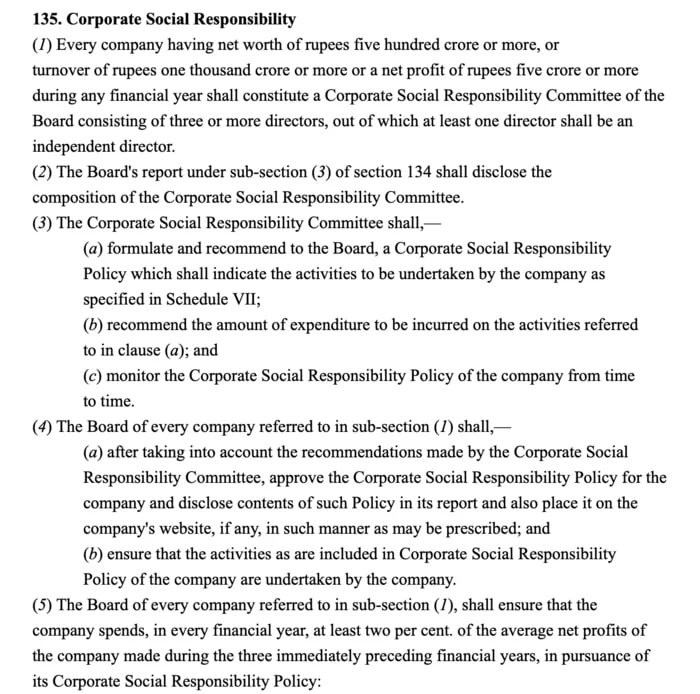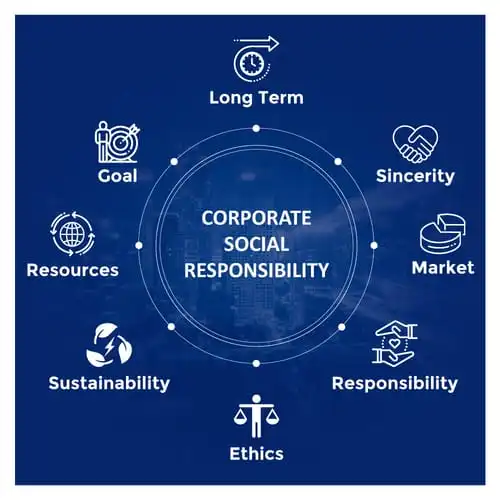CSR defines the efforts made by the company to strike a fine balance between economic, social, and environmental causes (TBL – Triple Bottom Line), at the same time addressing the concerns of shareholders and stakeholders.
Table of Contents
CSR in India: An Overview
India has a rich history of businesses getting involved in solving social and economic challenges in society. Though there are no documented CSR activities during the pre-independence days, after independence, JRD Tata became a pivotal figure in emphasising that industries and businesses should contribute to societal welfare. He wanted them to go beyond their regular duties and give back to India as responsible citizens.
Since then, there has been a growing trend among businesses contributing to public welfare programs with a desire to improve society. The acceptance of CSR particularly gained traction once it was mandated by the government that companies needed to share part of their earnings for the nation’s development.
On April 1, 2014, India became the world’s first nation to make CSR mandatory. Under section 135 of the Companies Act, 2013, it has become compulsory for the following types of companies to invest 2% of their net profits earned during the three preceding financial years to CSR activities:
- Companies with a net worth of Rs. 500 crores or more
- Companies with a turnover of Rs. 1000 crores or more
- Companies with a net profit of Rs. 5 crores or more
Here’s a snippet from the website of the Ministry of Corporate Affairs about the Act:

A report titled ‘India CSR Reporting Survey’ by KPMG showed that the CSR spending by Indian corporates has been rising year on year. According to the survey, companies spent Rs.8691 crore in 2019 compared to Rs.5115 crore in 2014-15.
These numbers may seem massive to a commoner, but remember, it’s a tiny amount compared to the overall size of India’s corporate landscape. Here is CSR spending of different states of India in the financial year 2019-2020:

Corporations are undertaking CSR projects over and above the minimum limit specified by law during these turbulent times. They are working with the government to rebuild the country to the way it was pre-corona times.
Why Should Your Business Care About CSR?

Moral & Ethical Obligation
The moral duty of a company is to give back to the society that has allowed them to succeed. Societies have provided businesses with honest and hardworking employees and a secure environment to conduct their everyday operations.
The growth is synergetic, as society has also relied on companies for a regular flow of money and economic stability.
When a business applies its vast expertise, resources, and talent pool to the social problems in society, it can have a more significant impact than some philanthropic organisation. Whether an existing business or a new one, its future growth and success will be deeply hinged on its ability to contribute to society in the coming days.
Retain and Attract Talent Pool
With the rising number of Millennials and Gen Z in the workforce, companies must change the way they conduct business. The present-day workforce consists of 32% Millennials, owing to baby boomers retiring at a rate of 10,000 per day. It’s estimated that Millennials will constitute about 75% of the workforce by 2025. Millennials are the most diverse, tolerant, tech-savvy, educated, and idealistic generation ever and are highly concerned about ethical records and labour practices while searching for employment in a company. The present generation also shares a widespread belief that it is their responsibility to make the world a ‘better place’.
For instance, today’s generation doesn’t want to be associated with companies that take the environment for granted and destroy it by any means. According to a survey by Deloitte, it was found that around 70% of Millennials admitted that commitment towards social responsibility is one of the key things they look for when choosing a company for their career growth.
Thus, to attract and retain talent, companies have no option other than CSR compliance, becoming more accountable and taking an active role in addressing the country’s socio-economic, cultural, and environmental issues.
Enjoy Higher Sales and Margins
Studies also show that over 50% of consumers are willing to buy products from a socially responsible company. Many incorrectly assume that there is no link between sales/margins and CSR. Though CSR might not boost your sales exponentially, it can undoubtedly help improve them. Here is a logical chain of events:
- A company takes up a CSR project
- It automatically results in improved brand image
- Customers learn about the brand and its CSR initiatives
- They start purchasing the company’s products
- This translates to improved sales numbers
In summary, when your customers care about your commitment to a social cause, they will show increased interest in your business over your competitor, thereby ensuring a continuous generation of income from them.
Positive Brand Value
CSR creates a positive impact in the minds of consumers and acts as a protective shield against potential rumours that might damage the company’s reputation. Due to increased competition, companies are devising various ways to improve their brand value. CSR is one such way to improve and retain value in the long run. Let’s take a look at some of the top brands in the world, namely McDonald’s, Coca-Cola and Pepsi. They have a well-managed CSR program, and their core operations revolve around social responsibilities that make people remember their brand even if they don’t buy their product.
Another example is Tata Group which is appreciated not only for its high-quality products and services but also for its commitment towards the greater good of the people.
Some Companies That Have Benefited From CSR
Infosys Ltd.
Infosys Ltd is one of the early adopters of Corporate Social Responsibility initiatives in India. CSR is also a key factor in supporting Infosys’s holistic growth through sustained environmental development, social and economic stewardship.
“CSR can’t be merely a job, it’s a passion.”
– Sudha Murthy, Chairperson of Infosys Foundation and the CSR arm of IT services.
Infosys spent nearly Rs. 360 crore towards various CSR initiatives in 2020. Since everyone in 2020 was severely affected by the pandemic, COVID-19 relief work dominated their CSR activities, followed by education and health-related programs.
The Infosys Foundation primarily works towards improving healthcare infrastructure, eliminating malnutrition, providing quality education, rehabilitating abandoned women and children, and conserving India’s culture and heritage. The Infosys Foundation also partners up with several non-governmental organisations and makes them a nodal agency for implementing projects.
A few CSR activities of Infosys worth mentioning are:
- Setting up a 100-bed quarantine centre in Bangalore through a partnership with Narayana Health City
- They helped set up an additional 182 beds for COVID-19 patients in the Bowring and Lady Curzon Medical College & Research Institute in Bengaluru.
- They have also introduced the Aarohan Social Innovation Awards, which will reward social innovations in healthcare, destitute care, rural development and sustainability.
- The restoration of several water bodies in Karnataka.
- They founded GoSports to enable excellence in sports.
- Conducted various disaster relief initiatives in Karnataka, Kerala and Tamil Nadu.
Here is a graph showcasing the average expenditure of the Infosys Foundation in CSR activities over the years:

Mahindra & Mahindra Ltd.
No other Indian company comes close to Mahindra & Mahindra and its commitment to climate change and sustainable business practices. During the financial year 2018-19, it spent a whopping INR 93 crores on CSR activities. This was made possible by head honcho Mr. Anand Mahindra who set international benchmarks for sustainability and led by example by becoming a member of the Indian Council for Sustainable Development.
In 1996, the company initiated a project known as Nanhi Kali, one of India’s largest CSR programs for girl child education. The project is for girl children in rural and urban pockets from low-income backgrounds and provides free education and work to empower their families. The delightful part is that these girls who benefited from Nanhi Kali give back to society by mentoring other young girls through the same program.
Mahindra and Mahindra have started several projects like this for the welfare of society and have gained from them. Today, they are the market leaders in utility vehicles and tractors in India.
Here is a graph depicting the average expenditure of the Mahindra group in CSR activities over the years:

ITC Ltd
ITC has committed to contributing towards rural development in a big way. One of its flagship CSR initiatives, ITC e-Choupal, has helped lakhs of farmers through economic empowerment.
It has achieved international standards for community development by creating awareness among farmers about digital literacy. This initiative is also making farmers financially healthy by connecting them to sellers via the internet to procure agricultural products. ITC has spent nearly INR 326 crores on CSR and the numbers constantly go up every year. The FMCG conglomerate has contributed to numerous other sectors such as education, healthcare, environmental conservation, sports and culture.
ITC’s vision to serve a larger social purpose has inspired several businesses to build substantial social capital for the nation. ITC strongly believes that the identity of a corporate brand is moulded by the perceptions of consumers irrespective of the product they sell.
Though there are many negative opinions about tobacco use and the companies selling them, ITC has ensured a positive brand image through its CSR initiatives. In fact, the social value offered by the company is so high that it has instilled a sense of pride among consumers while buying ITC products.
Here is a graph depicting the average expenditure of the ITC group on CSR activities over the years:

Apollo Tyres Ltd.
In FY 2019-20, Apollo contributed around INR 18.37 crores to its CSR initiatives and focused mainly on the environment, healthcare, and community development. Their initiatives followed a fairly straightforward approach; identify the right beneficiaries and ensure that their requirements are met accordingly.
The nature of their initiatives varies from location to location and depends on the need of the beneficiaries. Apollo Tyres also launched a unique initiative in the form of preventive healthcare support for truck drivers.
- It established 32 healthcare centres across 19 states in all popular transhipment hubs.
- It has also done a lot for the truck driver community in healthcare, such as HIV/AIDS prevention and awareness about TB, diabetes, hypertension, proper vision care, etc.
Through its initiatives, Apollo tyres has become a brand to remember. It has successfully created a band of loyal customers who think twice before moving to a competitor brand. Here is the summary of CSR expenditure split up of Apollo Tyres in 2019-20:

Remember, you don’t have to be a superhero to save the world or a conglomerate like the above companies to make a change. More importantly, CSR is not just for large international businesses anymore. Even small and medium-sized businesses based out of India have started finding ways to genuinely bring about change in the nation by helping one person/community at a time.
Why Is It Advisable To Get A Partner For CSR Implementation?
To manage the social responsibilities of companies, there are several CSR implementation partners/NGOs in India. These partners are a necessity today because India is a diverse country with a plethora of social challenges that vary from place to place.
It becomes difficult for companies to constantly find different ways to contribute despite their interest in doing so. Companies team up with NGOs and CSR implementation partners to ensure that their money is spent on the right cause and reaches the right people.
Here are some reasons why you should get a partner for CSR implementation:
Uncertainty on How to Implement CSR
- Though companies know that they have to contribute 2% of their average net profit towards CSR, the law does not fully define how it should be spent.
- CSR is an evolving process and cannot be standardised for all businesses. This makes it difficult for corporates because their reach and vision are different.
- There might be a chance that the different companies’ goals contribute differently to society as they cannot be measured with definite parameters.
- Most companies lack proper guidance on CSR implementation and the issues they face while implementing it. This includes overall management, maintenance and tracking of the performance of initiatives.
Hence, to make things easy, NGOs and CSR partners are helping carve a path for the seamless implementation of CSR activities.
Uncertainty About the Objectives of CSR
New entrepreneurs must understand that socio-economic stability is important to sustain in the market for the long run. Therefore, CSR can add value if one wants to be sustainable in his/her business.
Though several companies are now giving importance to social responsibility, some companies do not know why it’s needed and what the benefits are. Due to a lack of accurate information and the unavailability of trained personnel to inform companies about CSR, there is little understanding of CSR objectives.
CSR partners will not only help you identify different ways to direct CSR spending (beyond planting trees and donating to charity) but will also point out different objectives (such as improving brand image, increasing customer loyalty, better employee morale, etc.) that you can try achieving by indulging in those activities.
Lack of Research and Data
- Most research papers available on various societal challenges and rural development are targeted towards a planned result.
- Social patterns change according to people from one place to another.
- Most times, data found on the internet or in research papers might not be relevant or may even produce negative results for your initiatives.
This is where NGOs and CSR implementation partners come in handy. They primarily focus on targeted issues and research extensively to get accurate results for a specific social problem and specific geography that they are committed to.
Businesses need experts who will help make data-driven decisions. All you have to do is join a partner with matching goals to bring about a difference in society.
Why Choose Centum Foundation As Your CSR Implementation Partner?
Centum Foundation is a society registered under the Societies Registration Act, 1860. It handles the CSR part of Centum Learning that offers business training solutions in more than 15 countries. Centum Foundation has a Pan-India presence and has a widespread rural reach across every nook and corner of the country.
It conducts regular programs pertaining to national issues in the field of:
- Education and skill development
- The welfare of women and their empowerment
- Vocational training
- Health awareness
The current governing body of the Centum Foundation comprises veterans from the field of education and vocational training. The Centum Foundation believes in creating value for both businesses and societies through smart partnering which reflects in its various collaborations.
It has partnered with top brands such as Microsoft, Jubilant Foodworks Limited, Bata Limited and Hinduja Global Solutions.
Over the years, it has achieved extensive experience in employability-linked training in various industries such as IT/ITes and telecom, beauty and wellness, hospitality, healthcare, retail, apparel and construction.
When Centum Foundation partners with organisations, they ensure that employees get directly involved in social programs. It converts employees into active participants at the grassroots level for every change that your organisation wants to achieve.
Explore how we’re creating meaningful social impact through CSR projects in Employability linked Skill development and education, transforming communities and building brighter futures across India.
| Contact Us | Skills & Employability | Education |






